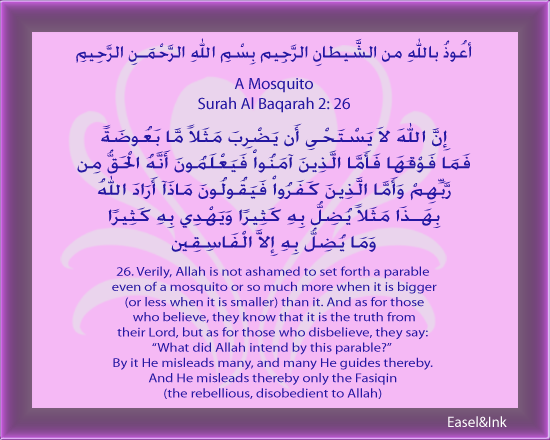As Salamu Alaikum wa Rahmatullahi wa Barakatuhu
A Parable about the Life of This World Abu Ja`far Ar-Razi reported that Ar-Rabi` bin Anas commented on this Ayah (2:26); "This is an example that Allah has given for the life of this world. The mosquito lives as long as it needs food, but when it gets fat, it dies. This is also the example of people whom Allah mentioned in the Qur'an: when they acquire (and collect the delights of) the life of this world, Allah then takes them away.'' Afterwards, he recited,
So, when they forgot (the warning) with which they had been reminded, We opened for them the gates of every (pleasant) thing. (Surah Al=An'am 6:44) In this Ayah (Surah Al-Baqarah 2:26) Allah stated that He does not shy away or hesitate in making an example or parable of anything, whether the example involves a significant or an insignificant matter.
Allah's statement,
Or so much more when it is bigger than it Fama fawqaha means, something bigger than the mosquito, which is one of the most insignificant and tiniest of creatures. Muslim narrated that Aishah said that the Messenger of Allah said,
No Muslim is harmed by a thorn, Fama fawqaha (or something larger), but a good deed will be written for him and an evil deed will be erased from his record. So Allah has informed us that there is no matter that is too small that is exempt from being used as an example, even if it was as insignificant as a mosquito or a spider. Allah said,
O mankind! A similitude has been coined, so listen to it (carefully): Verily, those on whom you call besides Allah, cannot create (even) a fly, even though they combine together for the purpose. And if the fly snatches away a thing from them, they will have no power to release it from the fly. So weak are (both) the seeker and the sought. (Surah Al-Hajj 22:73), Mujahid commented on Allah's statement,
Verily, Allah is not ashamed to set forth a parable even of a mosquito or so much more when it is bigger than it. "The believers believe in these parables, whether they involve large matters or small, because they know that they are the truth from their Lord, and Allah guides the believers by these parables.''
In his Tafsir, As-Suddi reported that Ibn 'Abbas, Ibn Mas'ud and other people among the Companions (Radhi Allahu Anhum) said,
By it He misleads many, "Meaning the hypocrites. Allah guides the believers with these parables, and the straying of the hypocrites increases when they reject the parables that Allah mentioned for them which they know are true. This is how Allah misleads them.''
And He guides thereby meaning, with the parables,
many from among the people of faith and conviction. Allah adds guidance to their guidance, and faith to their faith, because they firmly believe in what they know to be true, that is, the parables that Allah has mentioned. This is guidance that Allah grants them;
And He misleads thereby only the Fasiqin (the rebellious, disobedient to Allah), meaning, the hypocrites. The Arabs say that the date has Fasaqat, when it comes out of its skin, and they call the mouse a Fuwaysiqah, because it leaves its den to cause mischief. The Two Sahihs recorded `A'ishah saying that the Messenger of Allah (Sallallahu Alayhi wa Sallam) said,
Five animals are Fawasiq, and they must be killed during Ihram and otherwise: the crow, the kite, the scorpion, the mouse and the rabid dog. Fasiq, includes the disbeliever and the disobedient. However, the Fisq of the disbeliever is worse, and this is the type of Fasiq that the Ayah is describing here, because Allah described them as,
Those who break Allah's covenant after ratifying it, and sever what Allah has ordered to be joined and do mischief on earth, it is they who are the losers.(Surah Al-Baqarah 2:27) These are the characteristics of the disbelievers and they contradict the qualities of the believers.
Reference: Tafsir ibn Kathir (abridged) English version.









 Please check our
Please check our 




